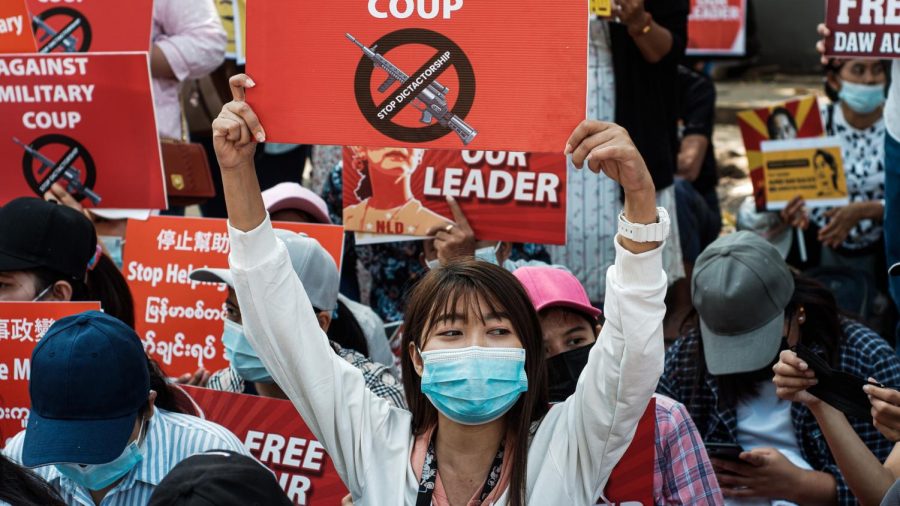Protests surge against the military junta in Myanmar
On Monday, Feb. 2, Burmese civilians hold up signs in protest after the military detains the State Counsellor, Aung San Suu Kyi.
On Monday, Feb. 1, the military of Myanmar formed to create a junta that overthrew their democratic government by taking control of the parliament and arresting civilian leaders, including Daw Aung San Suu Kyi, the state counselor of Myanmar.
In 2011, Myanmar ended 59 years of military rule and implemented a new parliament and reforms to their government. Daw Aung San Suu Kyi gained popularity in Myanmar after she won the 2015 election, but her 2020 election received tremendous dissent from the military.
“One of the things we study in Global Issues is the growth and spread of democracy, especially since WWII,” said Mr. Daniel Otahal, Global Issues teacher. “I think it is so easy to think about that as a process the world just becomes more democratic so we never really think about moments when democracy recedes.”
After Myanmar’s November 8, 2020 elections, the parliament was set to hold another election after the National League for Democracy, the leading civilian party, won with an 83% majority.
“The cause of the Myanmar protests was that high-ranking military officers believed the election to be fraudulent and therefore felt it necessary to intervene,” said Ethan Austermann, senior.
Across the country, Burmese people hold signs and protest the military junta who started to round up National League for Democracy lawmakers from their housing in Myanmar’s capital, Naypyidaw.
Senior Jacqueline Buccellato’s family immigrated to the United States from Myanmar in the 1980s. Buccellato has friends that are residing under the military junta.
“It’s extremely inspiring to see the Burmese people rise up and protest against these violations of their rights and the overthrowing of their leader, but I worry that they don’t have enough influence to put an end to the military coup,” Buccellato said.
The military junta suspended laws that allowed for restraint when searching through private property, restricting civilians from their democratic rights.
“In the day and age of social media, protesters have the ability to highlight some of the undemocratic nature of the government and that could bring in a lot of international pressure,” Otahal said.
The military continues to conduct night raids in search of people to arrest in addition to any video evidence of the
junta’s actions. On Wednesday, Feb. 10, thousands of people marched against the military junta at the Sule Pagoda.
“I’m very glad to see that the Burmese people show no intentions of stopping their protests,” Buccellato said. “I hope more people become aware of what is happening in Myanmar and feel inclined to spread awareness about it as well.”
Myanmar’s military commander-in-chief, Min Aung Hlaing, has been accused of several human rights violations including carrying campaigns against ethnic minorities.
“As Americans, it’s easy to forget that there are countries out there who are still struggling to gain independence from other countries or from some form of military rule, considering that the United States gained independence from Britain almost 250 years ago,” Buccellato said.

Natalia Berti is a senior who, when not chilling at a picturesque coffee shop or practicing her badminton footwork, enjoys re-watching the Avengers movies...












